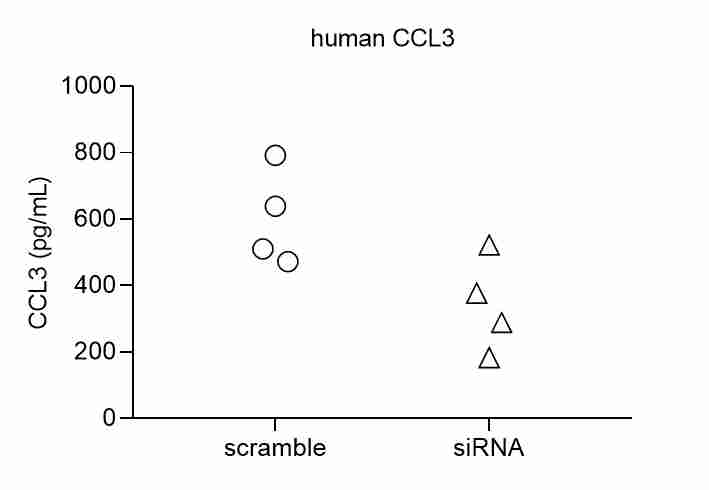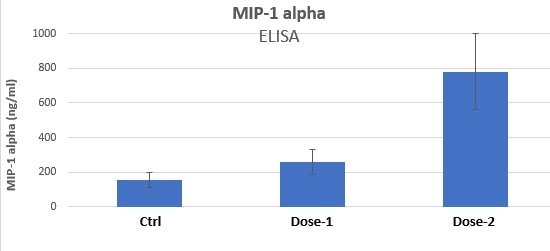Human CCL3/MIP-1 alpha Antibody Summary
Ala27-Ala92
Accession # P10147
Applications
Human CCL3/MIP-1 alpha Sandwich Immunoassay
Please Note: Optimal dilutions should be determined by each laboratory for each application. General Protocols are available in the Technical Information section on our website.
Scientific Data
 View Larger
View Larger
Chemotaxis Induced by CCL3/MIP‑1 alpha and Neutral-ization by Human CCL3/ MIP‑1 alpha Antibody. Recombinant Human CCL3/MIP-1a (Catalog # 270-LD) chemoattracts the BaF3 mouse pro-B cell line transfected with human CCR5 in a dose-dependent manner (orange line). The amount of cells that migrated through to the lower chemotaxis chamber was measured by Resazurin (Catalog # AR002). Chemotaxis elicited by Recombinant Human CCL3/MIP-1a (0.1 µg/mL) is neutralized (green line) by increasing concentrations of Goat Anti-Human CCL3/MIP-1a Antigen Affinity-purified Polyclonal Antibody (Catalog # AF-270-NA). The ND50 is typically 2-8 µg/mL.
 View Larger
View Larger
CCL3/MIP‑1 alpha in Human Tonsil. CCL3/MIP-1a was detected in immersion fixed paraffin-embedded sections of human tonsil using Goat Anti-Human CCL3/MIP-1a Antigen Affinity-purified Polyclonal Antibody (Catalog # AF-270-NA) at 10 µg/mL overnight at 4 °C. Tissue was stained using the Anti-Goat HRP-DAB Cell & Tissue Staining Kit (brown; Catalog # CTS008) and counterstained with hematoxylin (blue). Specific staining was localized to cytoplasm in lymphocytes. View our protocol for Chromogenic IHC Staining of Paraffin-embedded Tissue Sections.
Preparation and Storage
- 12 months from date of receipt, -20 to -70 °C as supplied.
- 1 month, 2 to 8 °C under sterile conditions after reconstitution.
- 6 months, -20 to -70 °C under sterile conditions after reconstitution.
Background: CCL3/MIP-1 alpha
The macrophage inflammatory proteins -1 alpha and -1 beta were originally co-purified from medium conditioned by an LPS-stimulated murine macrophage cell line. Human MIP-1 alpha refers to the products of several independently cloned cDNAs, including LD78, pL78, pAT464, and GOS19. These cDNAs all code for the same human protein that is a homologue of the murine MIP-1 alpha. Mature MIP-1 alpha and MIP-1 beta in both human and mouse share approximately 70% homology at the amino acid level. The MIP‑1 proteins are members of the beta (C-C) subfamily of chemokines.
Both MIP-1 alpha and MIP-1 beta are monocyte chemoattractants in vitro. Additionally, the MIP-1 proteins have been reported to have chemoattractant and adhesive effects on lymphocytes, with MIP-1 alpha and MIP-1 beta preferentially attracting CD8+ and CD4+ T cells, respectively. MIP-1 alpha has also been shown to attract B cells as well as eosinophils. MIP-1 proteins have been reported to have multiple effects on hematopoietic precursor cells and MIP-1 alpha has been identified as a stem cell inhibitory factor that can inhibit the proliferation of hematopoietic stem cells in vitro as well as in vivo. The functional receptor for MIP-1 alpha has been identified as CCR1 and CCR5.
Product Datasheets
Citations for Human CCL3/MIP-1 alpha Antibody
R&D Systems personnel manually curate a database that contains references using R&D Systems products. The data collected includes not only links to publications in PubMed, but also provides information about sample types, species, and experimental conditions.
17
Citations: Showing 1 - 10
Filter your results:
Filter by:
-
Cervico-Vaginal Inflammatory Cytokine and Chemokine Responses to Two Different SIV Immunogens
Authors: Nikki P. L. Toledo, Hongzhao Li, Robert W. Omange, Tamara G. Dacoba, Jose Crecente-Campo, Dane Schalk et al.
Frontiers in Immunology
-
NK cell intrinsic regulation of MIP-1? by granzyme M.
Authors: Baschuk N, Wang N, Watt SV et al.
Cell Death Dis
-
A novel SARS-CoV-2 Beta RBD DNA vaccine directly targeted to antigen-presenting cells induces strong humoral and T cell responses
Authors: Kuczkowska, K;Bjerkan, L;Stubsrud, E;Husbyn, HC;Chellappa, S;Hauge, A;Skarshaug, R;Torgersen, ML;Heim, JB;Jørgensen, MJ;Wold, CW;Schleimann, MH;Tolstrup, M;Granum, S;Fredriksen, AB;Pedersen, MW;Norheim, G;
Scientific reports
Species: Human
Sample Types: Cell Lysates
Applications: Western Blot -
CCL3-CCR5 axis contributes to progression of esophageal squamous cell carcinoma by promoting cell migration and invasion via Akt and ERK pathways
Authors: T Kodama, YI Koma, N Arai, A Kido, N Urakawa, M Nishio, M Shigeoka, H Yokozaki
Lab. Invest., 2020-05-26;0(0):.
Species: Human
Sample Types: Whole Cells
Applications: Neutralization -
TCR and Inflammatory Signals Tune Human MAIT Cells to Exert Specific Tissue Repair and Effector Functions
Authors: T Leng, HD Akther, CP Hackstein, K Powell, T King, M Friedrich, Z Christofor, S McCuaig, M Neyazi, CV Arancibia-, J Hagel, F Powrie, RS Peres, V Millar, D Ebner, R Lamichhane, J Ussher, TSC Hinks, E Marchi, C Willberg, P Klenerman
Cell Rep, 2019-09-17;28(12):3077-3091.e5.
Species: Human
Sample Types: Whole Cells
Applications: Flow Cytometry -
Increased Levels of Macrophage Inflammatory Proteins Result in Resistance to R5-Tropic HIV-1 in a Subset of Elite Controllers.
Authors: Walker W, Kurscheid S, Joshi S, Lopez C, Goh G, Choi M, Barakat L, Francis J, Fisher A, Kozal M, Zapata H, Shaw A, Lifton R, Sutton R, Fikrig E
J Virol, 2015-03-04;89(10):5502-14.
Species: Human
Sample Types: Whole Cells
Applications: Neutralization -
Resistance of human alveolar macrophages to Bacillus anthracis lethal toxin.
Authors: Wu W, Mehta H, Chakrabarty K, Booth JL, Duggan ES, Patel KB, Ballard JD, Coggeshall KM, Metcalf JP
J. Immunol., 2009-10-07;183(9):5799-806.
Species: Human
Sample Types: Cell Culture Supernates
Applications: ELISA Development -
Noninvasive detection of acute and chronic injuries in human renal transplant by elevation of multiple cytokines/chemokines in urine.
Authors: Hu H, Kwun J, Aizenstein BD, Knechtle SJ
Transplantation, 2009-06-27;87(12):1814-20.
Species: Human
Sample Types: Urine
Applications: Antibody Array Development -
Upregulation of human cytomegalovirus by HIV type 1 in human lymphoid tissue ex vivo.
Authors: Biancotto A, Iglehart SJ, Lisco A, Vanpouille C, Grivel JC, Lurain NS, Reichelderfer PS, Margolis LB
AIDS Res. Hum. Retroviruses, 2008-03-01;24(3):453-62.
Species: Human
Sample Types: Cell Culture Supernates
Applications: Luminex Development -
Fluorescence single-molecule counting assays for high-sensitivity detection of cytokines and chemokines.
Authors: Qui H, Ferrell EP, Nolan N, Phelps BH, Tabibiazar R, Whitney DH, Naelfski EA
Clin. Chem., 2007-11-01;53(11):2010-2.
Species: Human
Sample Types: Plasma
Applications: ELISA Development -
Effect of serum content and diluent selection on assay sensitivity and signal intensity in multiplex bead-based immunoassays.
Authors: Pfleger C, Schloot N, ter Veld F
J. Immunol. Methods, 2007-10-22;329(1):214-8.
Species: Human
Sample Types: Serum
Applications: Luminex Development -
Abnormal activation and cytokine spectra in lymph nodes of people chronically infected with HIV-1.
Authors: Biancotto A, Grivel JC, Iglehart SJ, Vanpouille C, Lisco A, Sieg SF, Debernardo R, Garate K, Rodriguez B, Margolis LB, Lederman MM
Blood, 2007-02-08;109(10):4272-9.
Species: Human
Sample Types: Cell Culture Supernates
Applications: Luminex Development -
HIV-1 pathogenesis differs in rectosigmoid and tonsillar tissues infected ex vivo with CCR5- and CXCR4-tropic HIV-1.
Authors: Grivel JC, Elliott J, Lisco A, Biancotto A, Condack C, Shattock RJ, McGowan I, Margolis L, Anton P
AIDS, 2007;21(10):1263-72.
Species: Human
Sample Types: Cell Culture Supernates
Applications: Luminex Development -
MIP-1alpha (CCL3) is a downstream target of FGFR3 and RAS-MAPK signaling in multiple myeloma.
Authors: Masih-Khan E, Trudel S, Heise C, Li Z, Paterson J, Nadeem V, Wei E, Roodman D, Claudio JO, Bergsagel PL, Stewart AK
Blood, 2006-07-18;108(10):3465-71.
Species: Human
Sample Types: Cell Culture Supernates
Applications: ELISA Development -
Gene copy number regulates the production of the human chemokine CCL3-L1.
Authors: Townson JR, Barcellos LF, Nibbs RJ
Eur. J. Immunol., 2002-10-01;32(10):3016-26.
Species: Human
Sample Types: Whole Cells
Applications: Neutralization -
Simian immunodeficiency viruses with defective nef genes show increased susceptibility to the noncytotoxic antiviral activity of CD8+ lymphocytes.
Authors: Binninger-Schinzel D, 2019, Norley S, Adler HS, Oberg HH, Kurth R
2002-03-01;294(1):209-21.
Species: Human
Sample Types: Whole Cells
Applications: Neutralization -
Low CCR5 expression protects HIV-specific CD4+ T cells of elite controllers from viral entry
Authors: Mathieu Claireaux, Rémy Robinot, Jérôme Kervevan, Mandar Patgaonkar, Isabelle Staropoli, Anne Brelot et al.
Nature Communications
FAQs
No product specific FAQs exist for this product, however you may
View all Antibody FAQsReviews for Human CCL3/MIP-1 alpha Antibody
Average Rating: 5 (Based on 2 Reviews)
Have you used Human CCL3/MIP-1 alpha Antibody?
Submit a review and receive an Amazon gift card.
$25/€18/£15/$25CAN/¥75 Yuan/¥2500 Yen for a review with an image
$10/€7/£6/$10 CAD/¥70 Yuan/¥1110 Yen for a review without an image
Filter by:





